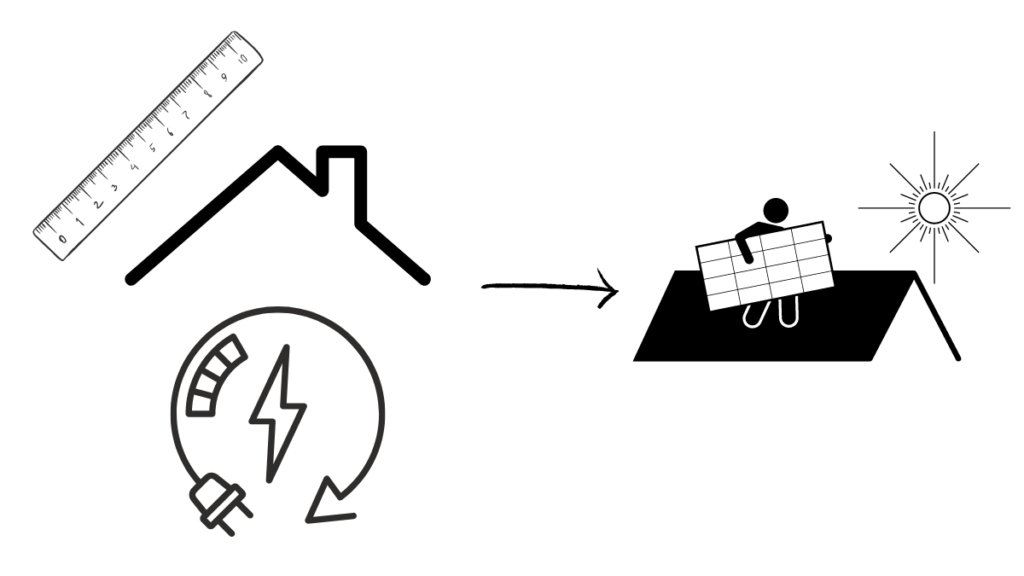Introduction
In recent years, New Jersey has emerged as a frontrunner in embracing renewable energy sources, making it an attractive place for property owners to invest in solar power.
This blog post will provide a comprehensive overview of the various solar incentives available to residents and business owners in Garden State. It is designed to help you decide about going green with solar panels while taking advantage of these lucrative financial benefits.
Understanding New Jersey Solar Incentives
To take advantage of the numerous solar incentives available in New Jersey, it’s important to understand key programs like Solar Renewable Energy Certificates (SRECs), net metering, and property tax and sales tax exemptions.
Overview Of Solar Renewable Energy Certificates (SRECs)
One of the most significant incentives for property owners in New Jersey considering solar panel installations is the Solar Renewable Energy Certificates (SRECs) program.
SRECs represent a tangible monetary value you can earn based on your solar system’s energy production. For every 1,000 kilowatt-hours (kWh) of electricity generated by your solar panels, you receive one SREC.
The market value of SRECs varies depending on supply and demand factors but has been known to reach hundreds of dollars per certificate. Consistent production from a well-maintained solar installation can add up quickly for New Jersey homeowners and make solar power even more financially attractive.
Keep in mind that while the availability and value of these credits may fluctuate over time due to changing regulations or market conditions, it remains crucial for property owners interested in harnessing the benefits offered through New Jersey’s rich array of solar incentives programs like Net Metering, Property Tax Exemptions and Sales Tax Exemptions alongside SRECs – ensuring maximum financial savings while contributing towards a greener future.
Net Metering
Net metering is an important component of New Jersey’s solar incentives program. It allows homeowners with solar panels to earn credits for their system’s excess energy and send it back to the grid.
These credits can then be used when their system is not producing enough power.
For example, if a homeowner’s solar panel system produces 500 kilowatt-hours (kWh) monthly but only uses 400 kWh, they will receive credits for the extra 100 kWh produced.
If their system only generates 300 kWh in another month but uses 500 kWh, they can use the credits earned from previous months to cover the difference without paying extra charges.
Property Tax And Sales Tax Exemptions
As a property owner in New Jersey considering solar panel installation, it’s important to note that the state offers both property tax and sales tax exemptions for solar energy systems.
This can result in significant cost savings over time as you generate clean energy. With a property tax exemption, homeowners don’t need to worry about any increase in their home value from installing solar panels affecting their annual taxes.
Additionally, with a sales tax exemption on the purchase of solar equipment, homeowners can save money upfront on the total cost of their system.
Financing And Rebate Programs
Financing and rebate programs are available to help offset the costs of installing solar panels in New Jersey. These programs include the NJ Solar Loan Program, which provides low-interest loans for homeowners to finance their solar energy systems.
Homeowners may also qualify for federal tax credits that can cover up to 30% of the cost of their system.
While financing and rebate programs provide financial benefits for property owners, it is important to note that they require careful consideration as these opportunities come with specific requirements regarding installation specifications and clean-energy generation goals.
Eligibility And Application Process For New Jersey Solar Incentives
Read on to learn about the eligibility criteria, installation requirements, and application process for New Jersey’s solar incentives programs.
Residential And Commercial Property Owners
Residential and commercial property owners in New Jersey can take advantage of various solar incentives. To be eligible, homeowners must comply with state and federal regulations and maintain their systems satisfactorily.
The NJ Sun program provides incentives for homeowners to install solar energy systems, while up to 30% tax credits are available for qualified homeowners with home solar.
Additionally, net metering allows homeowners to earn credits for excess energy their system produces, which can be used when they require more electricity than their system produces.
Finally, New Jersey offers a sales tax exemption on solar energy systems and property tax exemptions for those who install them.
System Size And Installation Requirements

If you’re considering installing solar panels on your property in New Jersey, it’s important to understand the system size and installation requirements. Here’s what you need to know:
- System Size
- The solar system size you need will depend on how much energy you want to generate and your available space. You should consider your current and future energy needs to determine the appropriate system size.
- Installation Requirements
- Solar panels must be installed by a licensed and certified installer, who will assess your property to determine the best location for your panels. The orientation of your roof, shading issues, and structural stability are all factors that should be taken into consideration during installation.
- Compliance with State and Federal Regulations
- Your solar system must comply with state and federal regulations regarding installation and interconnection with the electric grid. This includes obtaining necessary permits, following building codes, and arranging for inspections.
- Required Documentation and Forms
- You must submit documentation detailing your system’s specifications and proof of compliance with relevant regulations.
- Application Deadlines
- Different incentive programs in New Jersey have different application deadlines. Make sure to submit your application before the deadline to be considered for incentives.
By understanding these requirements, you can ensure that your solar panel installation is successful and qualifies for available incentives in New Jersey.
Compliance With State And Federal Regulations
It is important to comply with state and federal regulations when installing solar panels in New Jersey. Regulations ensure that solar systems are safe, reliable, and efficient.
The New Jersey Board of Public Utilities (NJBPU) has established guidelines for installing solar energy systems by the state’s Renewable Energy Portfolio Standard (RPS).
In addition, system owners must comply with federal regulations such as the National Electrical Code (NEC). Working with a reputable installer can help ensure compliance and avoid potential legal issues.
It’s also worth noting that some incentives may require compliance with specific regulations so it is essential to work closely with your installer or contractor to follow all guidelines provided by relevant agencies.
Installing a solar energy system in New Jersey requires a thorough understanding of local codes and requirements. For example, homeowners must obtain permits from their township or county before installation begins; these permits often include inspections throughout the project timeline.
Required Documentation And Forms
To be eligible for solar incentives in New Jersey, homeowners are required to provide certain documentation and forms. Here are the things you need to prepare:
- Proof of ownership
- You must show you own the property where you plan to install your solar system. This can be done through a copy of your deed or property tax statement.
- Signed contract with installer
- Your installer will provide a contract outlining the details of your solar installation, including costs and warranties.
- Building permit
- In most cases, you’ll need to obtain a building permit from your local government before beginning installation.
- Interconnection application
- If you plan to connect your solar system to the grid, submit an interconnection application with your utility company.
- Compliance certification
- Your installer will certify that your solar system meets all applicable state and federal regulations.
- NJBPU registration form
- Register with the New Jersey Board of Public Utilities (NJBPU) to receive Solar Renewable Energy Certificates (SRECs).
By providing these documents and completing the necessary forms, homeowners can take advantage of the many incentives available for installing solar panels in New Jersey.
Application Deadlines
It’s important to know the application deadlines for New Jersey solar incentives. The deadline for submitting applications can vary depending on the specific program, so it’s crucial to check the guidelines and regulations carefully.
For example, NJ Sun has a limited amount of funding available each year, and once that limit is reached, no more rebates will be issued until the following year. It’s also essential to remember that some programs require applicants to have their systems installed by a certain date to qualify for incentives.
Benefits Of Installing Solar Panels With Incentives In New Jersey
Installing solar panels with incentives in New Jersey can bring many benefits, including financial savings, reduced carbon footprint, increased property value, energy independence, and environmental benefits.
Financial Savings

One of the biggest benefits of installing solar panels with incentives in New Jersey is the potential for financial savings. Qualified homeowners can receive a tax credit of up to 30% against the cost of their system. They may also be eligible for rebates through programs such as NJ Sun.
Additionally, net metering allows homeowners to earn credits for excess energy their solar system produces, which can offset the cost of future energy bills.
Furthermore, investing in renewable energy sources like solar power can increase your property value while reducing your carbon footprint and environmental impact.
Reduced Carbon Footprint
Homeowners can significantly reduce their carbon footprint by installing solar panels with incentives in New Jersey. Solar energy is a renewable and clean source of power that does not emit harmful greenhouse gases into the environment.
In fact, an average residential solar system can offset over 100 tons of carbon dioxide emissions over its lifetime.
Moreover, choosing solar power over traditional sources like coal or gas-fired power plants reduces the dependence on non-renewable resources, thus promoting sustainable energy practices.
Increased Property Value
Installing solar panels on your property saves you money on energy bills and increases your home’s value. According to a study by the National Renewable Energy Laboratory, homes equipped with solar energy systems are sold at an average of 20% more than non-solar homes.
Moreover, properties with sustainable features, such as solar panels, tend to stay longer in the market than those without these features. Additionally, potential buyers are willing to pay more for a home that has already been outfitted with eco-friendly amenities because they know they will save money on utility bills over time.
Energy Independence
One of the major benefits of installing solar panels with incentives in New Jersey is achieving energy independence. By producing clean and renewable electricity, you become less reliant on traditional power sources, such as fossil fuels, and can potentially eliminate your energy bills altogether.
This financial and environmental independence benefits homeowners and contributes to grid stability and security. With New Jersey’s net metering program, excess energy produced by your solar system can be sold back to the grid or stored for later use, ensuring a reliable power source even during outages or high-demand periods.
Environmental Benefits
Installing solar panels with incentives in New Jersey has numerous environmental benefits. Property owners can reduce their carbon footprint by producing electricity from renewable sources and help combat climate change.

Homeowners can also enjoy clean energy and sustainable living while reducing their dependence on fossil fuels. Reducing airborne pollutants has positive impacts on both the environment and human health.
Working With A Reputable Solar Installer In New Jersey
Working with a reputable and experienced installer is crucial when installing solar panels. This section will discuss how to find the right solar installer in New Jersey and what qualifications they should have.
Finding A Professional And Experienced Installer
When looking for an installer to install your solar panels, finding a professional and experienced one is important. Here are some key factors to consider:
- Check the installer’s credentials and qualifications, such as certifications from industry associations.
- Look into the installer’s experience by asking for references or checking online reviews.
- Ensure that the New Jersey installer has a valid license and insurance.
- Determine whether the installer has the necessary experience to work with the type of solar system you wish to install.
- A professional installer will furnish a comprehensive quote, encompassing all expenses and specifying the items and services included or excluded from their installation service.
By taking these steps, you can be confident that you’re working with a reputable and knowledgeable solar panel installer who will ensure proper installation and maintenance of your solar energy system.
Evaluating The Installer’s Qualifications And Credentials
When choosing a solar installer for your home in New Jersey, it’s essential to evaluate their qualifications and credentials. Here are some factors to consider:
- Experience: Look for an installer with sufficient experience in the solar industry. They should have a track record of successful installations and satisfied customers.
- Licenses/Certifications: Check whether the installer has the proper state licenses and certifications to work on your solar project. You can verify this information on the NJBPU website.
- Insurance: Your solar installer must have liability and workers’ compensation insurance. This protects you against potential damages or injuries during installation.
- References/Reviews: Check the installer’s references and online reviews from previous customers. They can provide insights into their quality of work and customer service.
- Warranty/Guarantee: Choose an installer with a warranty or guarantee on their workmanship, equipment, and parts used in your solar system.
By evaluating these qualifications and credentials, you can select a reliable and professional solar installer who can help you harness the benefits of renewable energy while minimizing risks associated with incorrect installation or defective equipment.
Ensuring Quality And Customer Service
When installing solar panels, ensuring quality and customer service is crucial. Working with an experienced and professional solar installer in New Jersey will save you time, money, and headaches.

Look for a reputable company that has been in business for several years and has a proven track record of satisfied customers.
A good installation company should be able to explain the benefits of solar energy clearly. They should provide different options based on your specific needs, offer competitive pricing, and complete projects within the specified timeline while adhering to all state regulations.
A good customer service department can help answer any questions you may now or in the future regarding your new system. Such a company should also ensure proper maintenance after installation to operate efficiently throughout its lifespan.
Conclusion
In conclusion, New Jersey offers a range of solar incentives that make installing solar panels an attractive option for property owners. With tax credits, rebates, and net metering programs, it’s easy to see why so many homeowners are switching to clean energy.
Not only will you benefit financially from reduced energy costs and increased property value, but you’ll also be doing your part to reduce carbon emissions and combat climate change.
Ensure you work with a reputable installer who can help guide you through the process and ensure a quality installation.
What Can DroneQuote Do
At DroneQuote, we are committed to helping homeowners in New Jersey take advantage of the many solar incentives available to them. With our top-notch roofing and solar services, you can switch to clean energy and save money on your energy bills.
If you want to install solar panels on your property, don’t wait any longer. Sign up today to learn more about our services and how we can help you through installation. Our team of experts will ensure that your installation is done right, so you can enjoy all the benefits of clean, renewable energy. Act now to reduce your carbon footprint and increase your property value with solar power.
FAQs:

- What are the solar incentives currently available in New Jersey?
New Jersey offers several incentives for homeowners and businesses to install solar energy systems. This includes tax exemptions, rebates, performance-based incentives, and net metering programs.
- Who is eligible for these solar incentives in New Jersey?
Solar energy systems can be eligible for incentives based on size and performance specifications.
- How much can I save with New Jersey’s solar incentive programs?
Factors such as your electricity usage, installation costs, system type, and property location will determine the amount of savings. Experts estimate that installing a solar panel system of appropriate size could potentially reduce household utility bills.
- What steps must I take to qualify for New Jersey’s solar incentive programs?
To qualify for these programs, you must first have an approved home or business site capable of sustaining a photovoltaic (PV) array connected directly to the grid & then work with a licensed NJ installer who can provide detailed information about all requirements such as necessary permits, etc. before they begin the installation of panels onto your roof so everything runs smoothly from start-to-finish.
